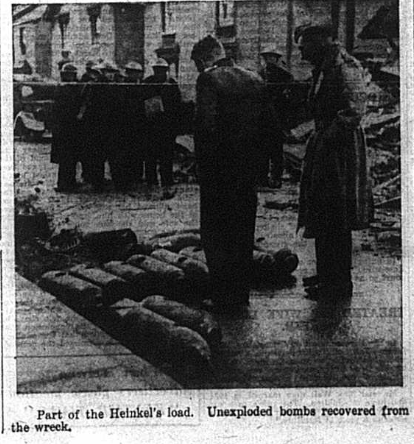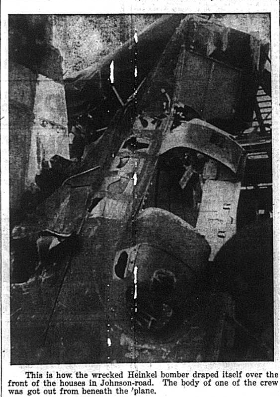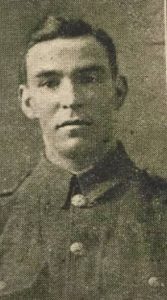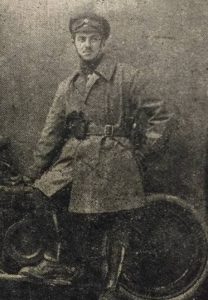Three of Crew Killed
FOURTH BALES OUT AND SURRENDERS
Two Houses Wrecked
Crippled some miles away by the accurate anti-aircraft fire of the gunners of London’ barrage, a German Heinkel 111 swooped low over the Bromley district on Saturday evening.
The pilot’s efforts to make the machine climb failed, and it lost height rapidly as it flew over the town, to earth finally on two semi-detached houses in Johnson Road, Bromley Common.
Four people wee in the two houses that were almost demolished by the plane. They were Mr & Mrs Albert Henry Button, who live at No. 16, Mrs Herbert Alfred Monday of No. 16. Mrs Monday, who was 30 years of age, was killed when the house fell about her, and her 34 year old husband, a motor engineer, was taken to hospital suffering from burns and other injuries. Mr and Mrs Button, both of whom are well advanced in years, were suffering from severe shock when they were removed from their homes, having a miraculous escape from serious injury.
Of the four occupants of the machine, two, including the pilot, were in the plane when it crashed. Both were killed instantly. A third, who baled out just before the crash, struck the roof of 14 Johnson Road. As he rolled off the roof his parachute caught in the gutter and he was left dangling in mid-air. He died only a few minutes after he had been brought to ground level.
 The fourth and only surviving member of the crew had obviously jumped from the doomed plane earlier than his comrade, and made a successful landing in the grounds of Sundridge Park Hotel, two miles from the scene of the crash. He walked up to the hotel and surrendered himself.
The fourth and only surviving member of the crew had obviously jumped from the doomed plane earlier than his comrade, and made a successful landing in the grounds of Sundridge Park Hotel, two miles from the scene of the crash. He walked up to the hotel and surrendered himself.
Load of Heavy Bombs
When rescue workers began searching the debris they found that the plane had been loaded with 29 bombs each weighing about 1cwt. Three had not exploded, and as a precautionary measure all the residents of Johnson Road were evacuated, some people going to a rest centre and others spending the rest of the night in public shelters or at the homes of friends or relatives.
None of the bombs exploded before they were removed from the wrecked plane and rendered useless. Most householders in the rad were able to return to their homes by Monday night,
Civilian Heroes
The three civilian heroes of the incident were Mr E.G. Darby, 24 Johnson Road, Mr William Wilson, 19 Johnson Road and Mr B.W Jarman, 24 Chatterton Road. Not being wardens or rescue workers, it was not their duty to assist in the clearing of the debris or rescuing the trapped Mr and Mrs Monday. Yet because, to quote on of them, “I felt as if I must do something to help,” they put aside the justifiable excuse of helping their families gather a few things together before evacuating their homes, and worked magnificently and fearlessly in the bomb-sprinkled wreckage, although they must have thought at the time that any of the 29 bombs that fell with the machine might explode at any minute.
Telling his story to a Kentish Times reporter in the unassuming manner of a true hero, Mr Darby, who lives at the house next door t the two semi-detached houses hit by the plane, said, “I was standing at y back door and heard a noise like a tornado, or a huge bomb falling, but I did not know it was a plane at the time. There was a terrible swishing sound, and I stepped back quickly and slammed the door.”
When the plane crashed, Mr Darby rushed out into the road. He described the cloud of petrol fumes as being as thick as a London fog. Mr Wilson had come from his house too and together they scrambled over the wreckage of Mr Monday’s house and tore with their bare hands at the debris in an effort to free the trapped man.
Source:
Bromley & District Times, 22nd November 1940






